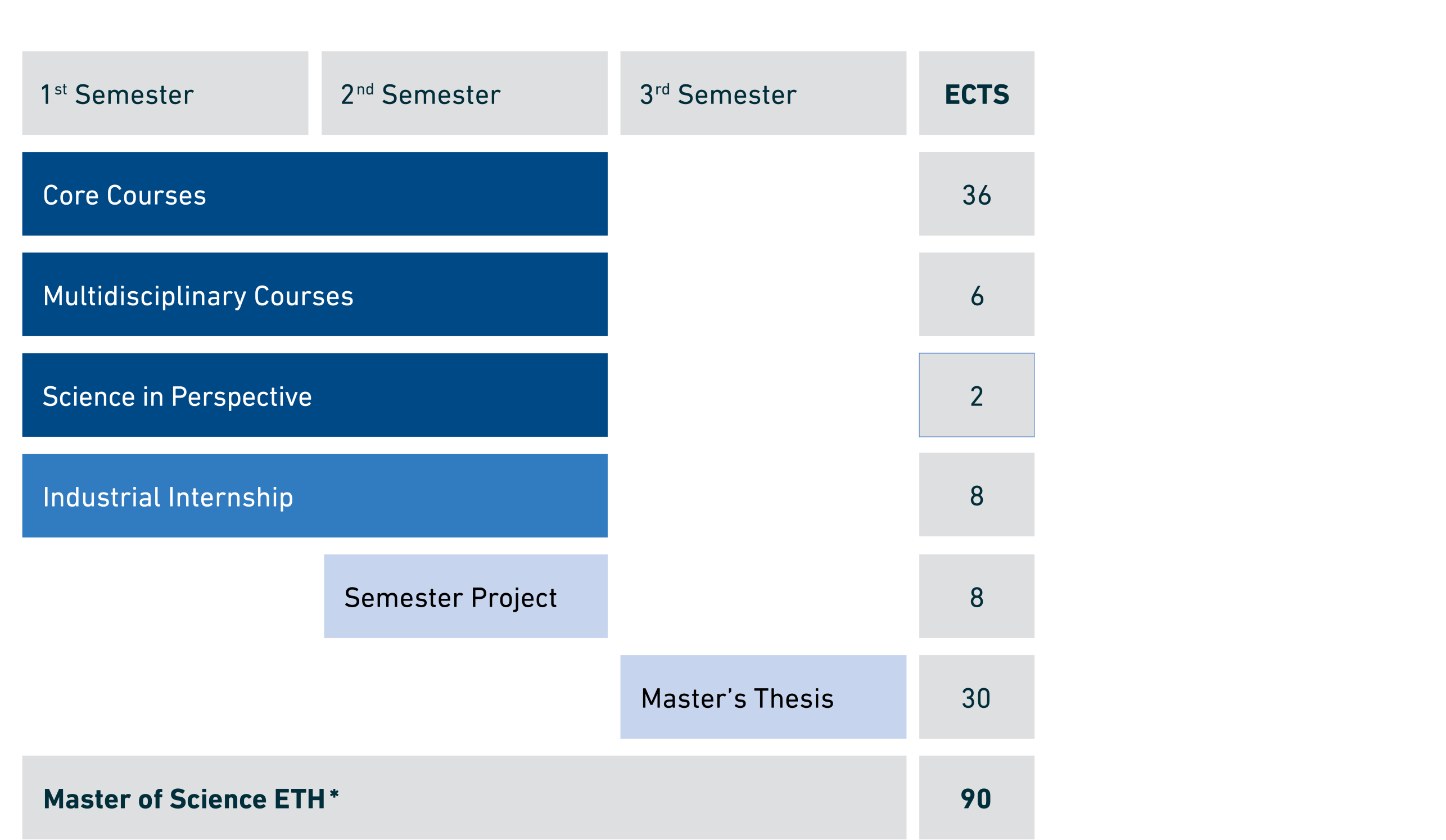Curriculum
Students must obtain 90 credit points to qualify for the Master's Degree. The curriculum is structured in six categories. In each category a given number of credit points must be attained.
The Core Courses (36 credit points) lay the foundation for the Master's Program by providing the students with core knowledge in their area of specialization. Together with the students, tutors define the courses for the category Core Courses, which are included in the individual study plan (Download Learning Agreement (PDF, 1 MB)).
In order to facilitate the choice, the course catalogue allocates the recommended Core Courses to five different topical areas, primarily in order to guide the students in the choice of courses. These topical areas are not equivalent to different specializations. They serve as the starting point for planning an individualized curriculum, but students are free to choose optional courses from more than one area:
- Devices and Systems
- Energy Conversion and Quantum Phenomena
- Material Surfaces and Properties
- Modeling and Simulation
- Laboratory courses
The courses in this category (6 credit points) give students an opportunity either to deepen their degree-specific knowledge or to broaden their understanding of economics and the social sciences.
The Multidisciplinary Courses are chosen in agreement with the tutor and have to be included in the Download Learning Agreement (PDF, 1 MB).
Science in Perspective (SiP) (2 credit points) is an integral part of the curriculum at ETH Zurich. It opens up new perspectives in natural and engineering sciences and teaches students to understand and critically question the correlations between scientific knowledge, technological innovations, cultural contexts, individuals and society. The courses are selected from the special course catalogue “Science in Perspective (SiP)” of the Department of Humanities, Social and Political Sciences (D-GESS) at ETH Zurich.
The Semester Project (8 credit points) makes use of the technical knowledge acquired during the Master's Program and is aimed at training the students in the solution of specific micro and nanosystem problems.
The Semester Project is supervised by an ETH Zurich professor and the choice of the subject and the supervision must be approved in advance by the tutor.
The supervisor proposes the subject of the project, supports the student in the preparation of the project plan, defines the road map together with the student, monitors the overall execution of the project, fixes the dates for completion of the project and presentation and sets the criteria for assessment.
The Semester Project is carried out independently by each student and corresponds to a work load of 240 hours (6 weeks full-time). It can be completed in part- or full-time. It is generally undertaken in the second semester. The project has to be registered through myStudies until latest one month after the start date and the submission deadline has to be defined, too. The given details are binding.
Students need to adhere to the general practice of source citation in this subject and are required to read the notice on plagiarism.
To request an extension of the submission deadline for a project or thesis, the form Download Request to extend project/thesis (PDF, 613 KB) needs to be filled in and submitted either by email or by post to the D-MAVT Student Administration.
The main objective of the 12-week internship is to expose Master’s students to the industrial work environment. The Industrial Internship can be undertaken in a Swiss or a foreign company, organized by the student her/himself. The aim of the Industrial Internship is to apply engineering knowledge to practical situations.
The internship may be completed before starting the Master’s Program or during the study program. The first option is recommended. Only internships that have been completed after achieving all required credit points for the Bachelor’s Program may be credited as Industrial Internship. The internship can be split into two parts.
The approval of the tutor is needed for the recognition of the Industrial Internship.
The Download Study Guide (PDF, 1.7 MB) contains a list of potential activities and more information about the internship.
For the recognition of the completed Industrial Internship, following document must be uploaded to the internship application:
- Confirmation from the company including the activities and tasks performed during the internship
The Master's Thesis (30 credit points) constitutes a maximum six-month, full-time project, aimed at advancing the skills and capabilities of students to work independently and creatively toward the solution of an independent research problem.
The Master's Thesis is either closely related to the research activity of the tutor or of an ETH Zurich professor or deals with a challenging topic faced by industry.
The tutor approves the subject and the supervisor (ETH Zurich professor) of the Master's Thesis. The supervisor defines the road map together with the student in written, is responsible for monitoring the structure and quality of the Master's Thesis and establishes the milestone and dates for start and completion of the Master's Thesis and the criteria for assessment.
The Master’s Thesis has to be registered through myStudies until latest one month after the start date. The submission deadline is calculated automatically by the system (28 weeks). The given details are binding.
Students are instructed to read the notice on plagiarism. The Master’s Thesis will be produced independently by the student, who adheres to the general practice of source citation in this subject.
The Director of Studies may approve an extension of the submission deadline, if cogent reasons are given.
To request an extension of the submission deadline for a project or thesis, the form Download Request to extend project/thesis (PDF, 613 KB) needs to be filled in and submitted either by email or by post to the D-MAVT Student Administration.
In order to start the Master's Thesis, students must:
- have obtained a Bachelor's Degree;
- have fulfilled all specified admission conditions;
- have achieved 32 credit points in the category Core Courses;
- have acquired the 8 credit points for the Semester Project.
